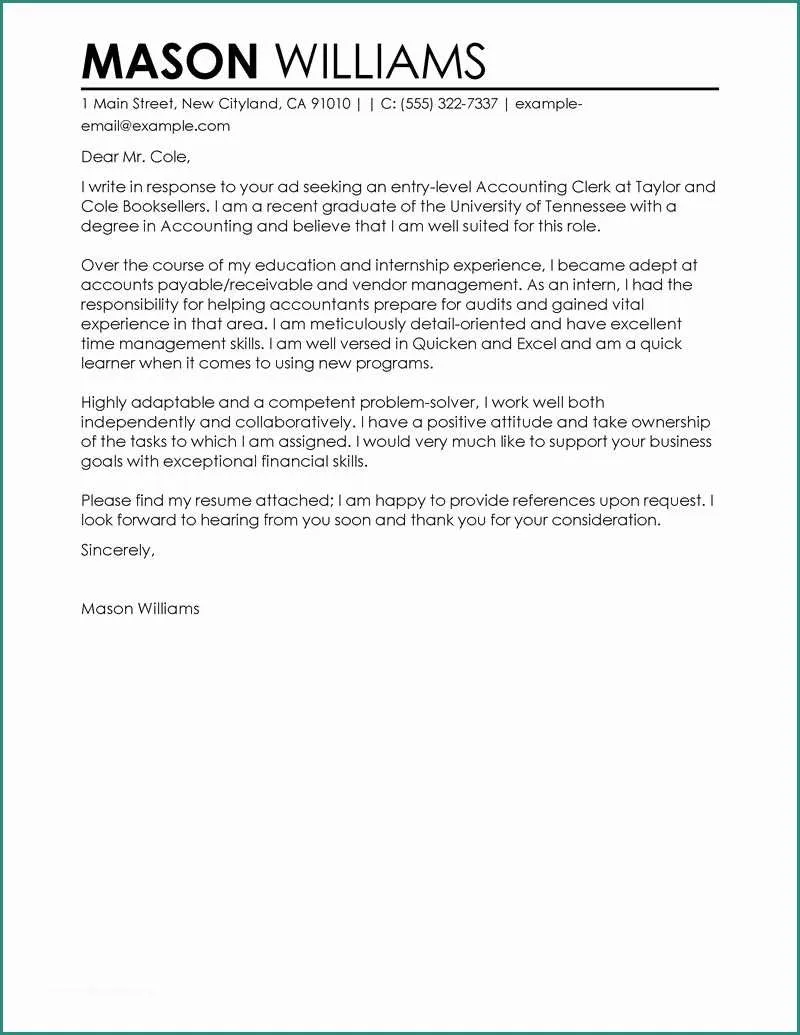Why Your Accounting Internship Cover Letter Matters
In the competitive world of accounting, landing an internship is a crucial first step toward a successful career. Your accounting internship cover letter is your first impression, a chance to showcase your potential and convince employers you’re worth their time. It’s not just a formality; it’s your opportunity to highlight your skills, experience, and passion for the field. A well-crafted cover letter can set you apart from other applicants, demonstrating your attention to detail, communication skills, and genuine interest in the specific internship. It allows you to personalize your application, showing how your unique abilities align with the company’s needs and values. A strong cover letter can significantly increase your chances of securing an interview, opening doors to valuable learning experiences and professional growth. This is your chance to shine before even stepping foot in the office, so make sure it counts.
Highlighting Your Skills
Your cover letter is the perfect place to spotlight the skills that make you a strong candidate. Instead of simply listing skills, weave them into the narrative, demonstrating how you’ve utilized them in the past. This approach shows, rather than tells, potential employers about your capabilities. Make sure to tailor your skills to match the job description, emphasizing those most relevant to the internship requirements. For instance, if the internship involves data analysis, highlight your proficiency with software like Excel or any experience with data visualization tools. If teamwork is essential, describe instances where you collaborated effectively on projects. Remember, the goal is to illustrate your competence and adaptability, convincing the employer that you possess the necessary skills to excel in the internship role.
Technical Skills to Showcase
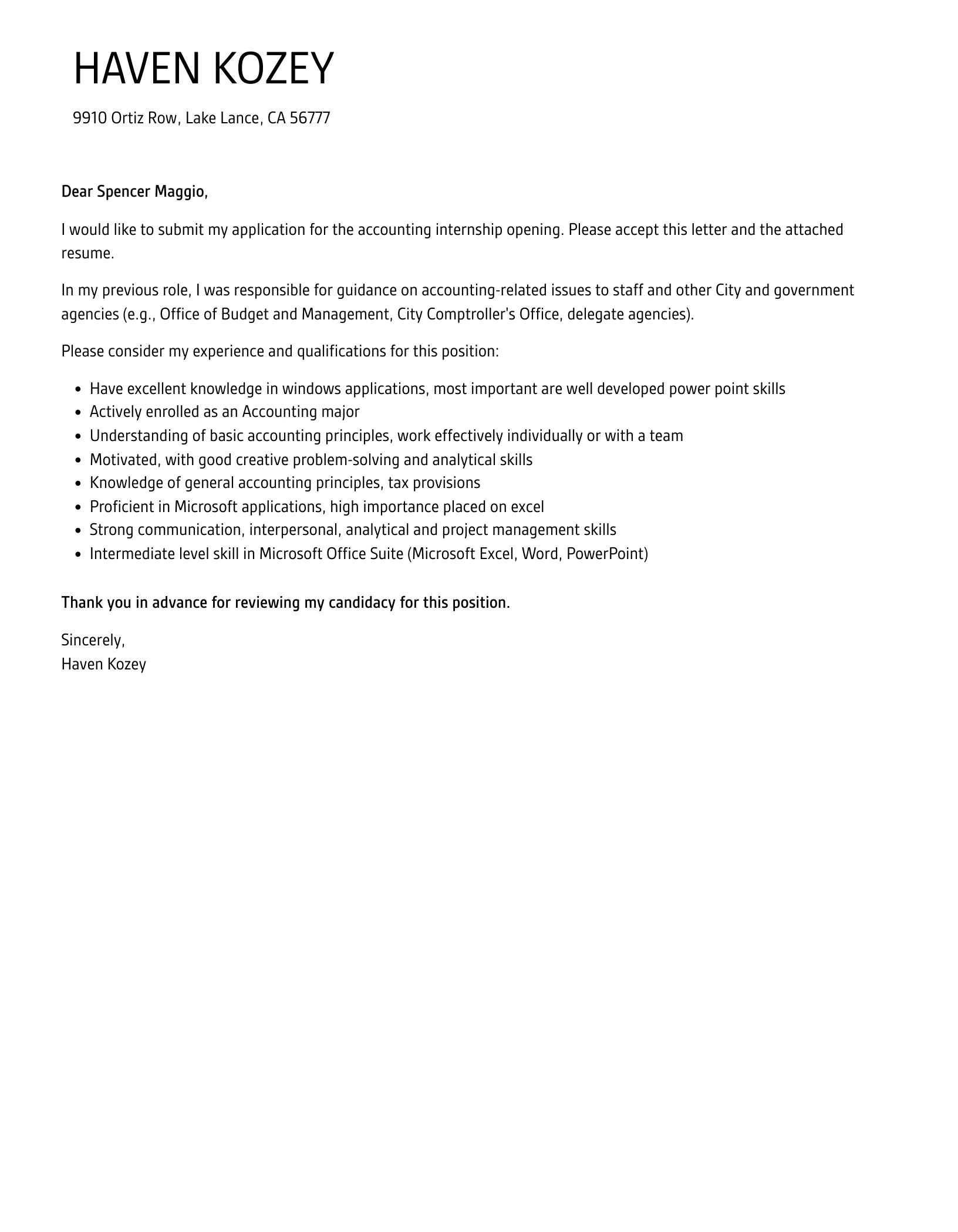
Technical skills are the backbone of any accounting role, and highlighting them in your cover letter is essential. Mention your proficiency in accounting software such as QuickBooks, SAP, or Oracle. If you have experience with specific financial analysis tools, be sure to include them. Emphasize your knowledge of accounting principles (GAAP or IFRS), and any coursework or certifications you’ve obtained, like a CPA candidate status. If you’re familiar with budgeting, forecasting, or financial reporting, make sure to state it explicitly. Showcase any experience with tax preparation software or knowledge of tax regulations. These technical competencies demonstrate your readiness to contribute to the team and perform the tasks required of an accounting intern.
Soft Skills Employers Value
While technical skills are important, employers also value soft skills that contribute to a positive work environment and successful teamwork. Highlight your communication skills, emphasizing your ability to articulate complex information clearly and concisely, both verbally and in writing. Showcase your problem-solving skills by describing how you’ve tackled challenges in previous projects or academic settings. Mention your organizational skills, including your ability to manage multiple tasks and meet deadlines. Demonstrate your attention to detail by providing examples of how you’ve ensured accuracy in your work. If you possess strong teamwork abilities, describe instances where you collaborated with others effectively. Emphasizing these soft skills can demonstrate to the employer that you will be a valuable asset.
Showcasing Relevant Experience
Your cover letter should provide evidence of any relevant experience, whether it’s through academic projects, volunteer work, or previous internships. This is the section where you connect your skills to the actual demands of the internship role. Quantify your achievements whenever possible. For example, rather than simply stating you worked on a financial project, specify the project’s scope, the results achieved, and your specific contributions. Did you identify cost savings, improve efficiency, or contribute to more accurate financial reporting? Provide concrete examples to prove your capabilities. Highlighting your past experiences will show the employer that you can translate theoretical knowledge into practical results. The more specific the experience, the better you can convince the employer of your abilities.
Academic Achievements
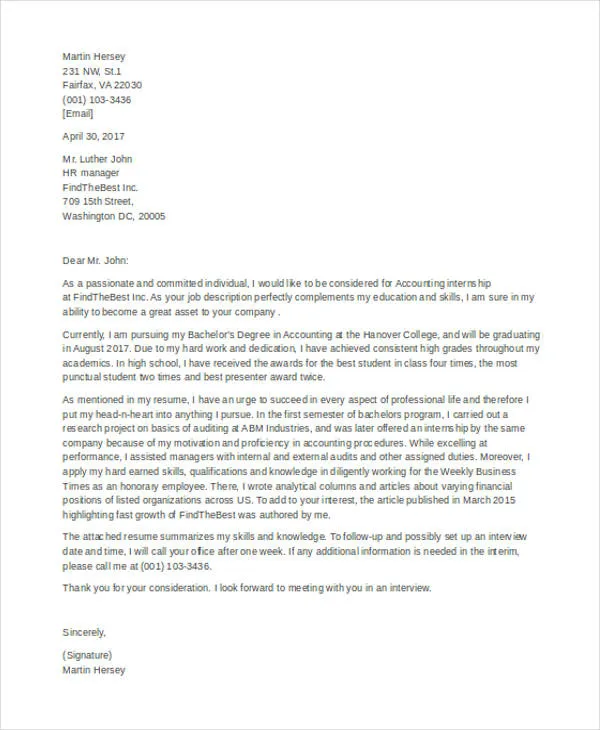
Even if you have limited professional experience, highlight your academic achievements. This shows your potential and dedication to the accounting field. Include your GPA, especially if it’s impressive, and any relevant coursework you have excelled in. Mention any accounting-related clubs or societies you are involved in, along with any leadership positions you hold. If you’ve received academic awards or scholarships, be sure to include them. Briefly describe any significant projects or research you’ve conducted in accounting, showcasing your interest in the field. Highlighting your academic achievements demonstrates your commitment to learning and your ability to excel in a structured environment. It gives the employer a good indication of your overall abilities.
Previous Internships or Work Experience
If you’ve had any previous internships or work experience, even if it’s not directly related to accounting, make sure to highlight them. This provides evidence of your ability to handle workplace responsibilities and your professional demeanor. Describe your roles and responsibilities, emphasizing any skills you gained that are relevant to accounting, such as data entry, organization, or customer service. Quantify your achievements whenever possible. For example, mention the number of transactions you processed, the percentage of error reduction you achieved, or the positive feedback you received. If you had any involvement in accounting tasks, briefly mention them. Even if the experience is unrelated, demonstrate how it has made you a more well-rounded and employable candidate, and how the skills can translate to a career in accounting.
Tailoring Your Letter
One of the most crucial aspects of an effective cover letter is tailoring it to the specific internship and company. Generic cover letters are easily recognizable and often end up in the rejection pile. Research the company thoroughly and demonstrate your understanding of their values, mission, and current projects. Identify the specific skills and experiences that the employer is looking for in the job description, and make sure to highlight them in your letter. Instead of simply restating your resume, use the cover letter to connect your qualifications to the company’s needs and explain why you are a good fit. Show genuine interest in the specific role and the company. This personalized approach will show the employer that you have taken the time to understand their needs and are seriously interested in the opportunity.
Researching the Company
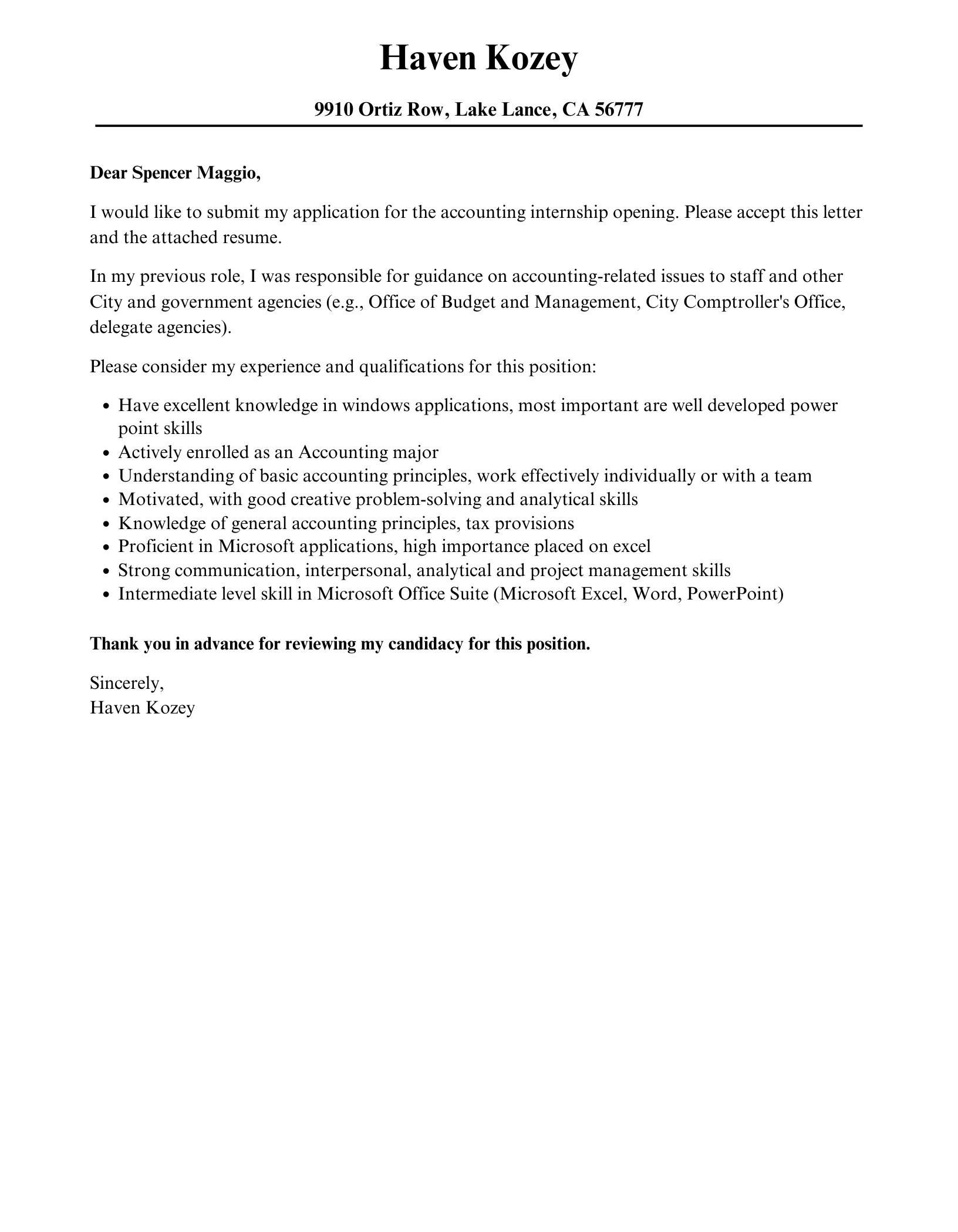
Before writing your cover letter, invest time in researching the company. Visit their website, read about their history, mission, and values, and learn about their current projects and recent news. Explore their social media presence to gain insight into their culture and employee environment. Identify the key people within the accounting department, and if possible, mention their names in your letter. Tailor your cover letter to address the specific requirements of the company. Demonstrate your understanding of the company’s business by referencing their products, services, and industry position. Showing your knowledge about the company demonstrates your interest and allows you to align your skills and experience with their specific needs.
Addressing the Specific Job Requirements
Carefully review the job description to identify the specific requirements and qualifications. Note the skills, experience, and qualifications that the employer is looking for and make sure to address these in your cover letter. Use the same keywords and phrases that are used in the job description, but be careful not to simply copy and paste. Instead, integrate these keywords naturally into your narrative, demonstrating how your skills and experience align with the requirements. If the job description mentions specific software, responsibilities, or tasks, make sure to address them directly. Provide concrete examples of how you have met those requirements in your previous experience, highlighting the skills and achievements that match the employer’s needs. Aligning your cover letter with the job requirements will significantly increase your chances of securing an interview.
Formatting and Proofreading
A well-formatted and error-free cover letter is essential for making a positive impression. Proofreading is critical, as even minor errors can undermine your credibility and attention to detail. A cover letter that is visually appealing and easy to read demonstrates professionalism and attention to detail. Pay close attention to layout, grammar, and spelling to ensure that your cover letter represents you in the best possible way.
Formatting Essentials
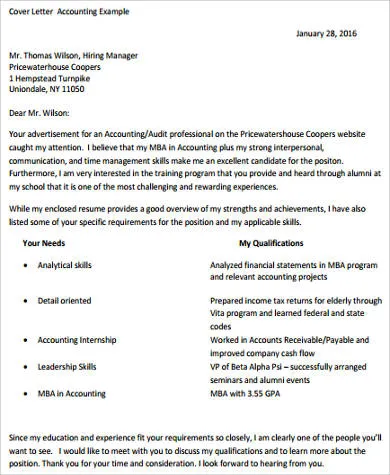
Start with a professional and clear format. Use a standard font such as Times New Roman or Arial, with a font size of 11 or 12 points. Keep the letter concise and easy to read, aiming for one page in length. Use clear headings and paragraph breaks to organize the information effectively. Use a professional business letter format, including your contact information, the date, the employer’s contact information, a formal salutation, and a professional closing. Be consistent with your formatting throughout the letter, and ensure that the layout is neat and visually appealing. Use bullet points to highlight key skills or achievements, and keep your paragraphs short and focused. Well-formatted cover letters make your letter easy for the reader to scan and grasp the most important aspects of your qualifications.
Proofreading Checklist
Thorough proofreading is the final step in crafting a compelling cover letter. After you’ve finished writing, set the letter aside for a while and review it with fresh eyes. Check for any spelling mistakes, grammatical errors, and punctuation issues. Verify that your contact information is accurate. Make sure the company name and the hiring manager’s name are correct. Review the letter for clarity, flow, and coherence, and ensure that your key points are easy to understand. Have a friend, family member, or career advisor review your cover letter and get their feedback. A second pair of eyes can often catch errors that you might have missed. Proofreading is crucial for demonstrating your attention to detail and professionalism. Ensuring your cover letter is polished and free of errors is vital to making a positive impact.
Making a Strong Impression
Your cover letter is a chance to make a strong first impression and leave a lasting impact on the employer. The tone and style of your writing should reflect your personality and professionalism. The objective is to grab the hiring manager’s attention from the start and maintain their interest. Your cover letter is an extension of your brand, making sure that it accurately reflects who you are. By focusing on the essential components and perfecting your writing, you will be able to showcase your potential and stand out among the other applicants. Your cover letter should stand out from the rest.
The Opening Paragraph
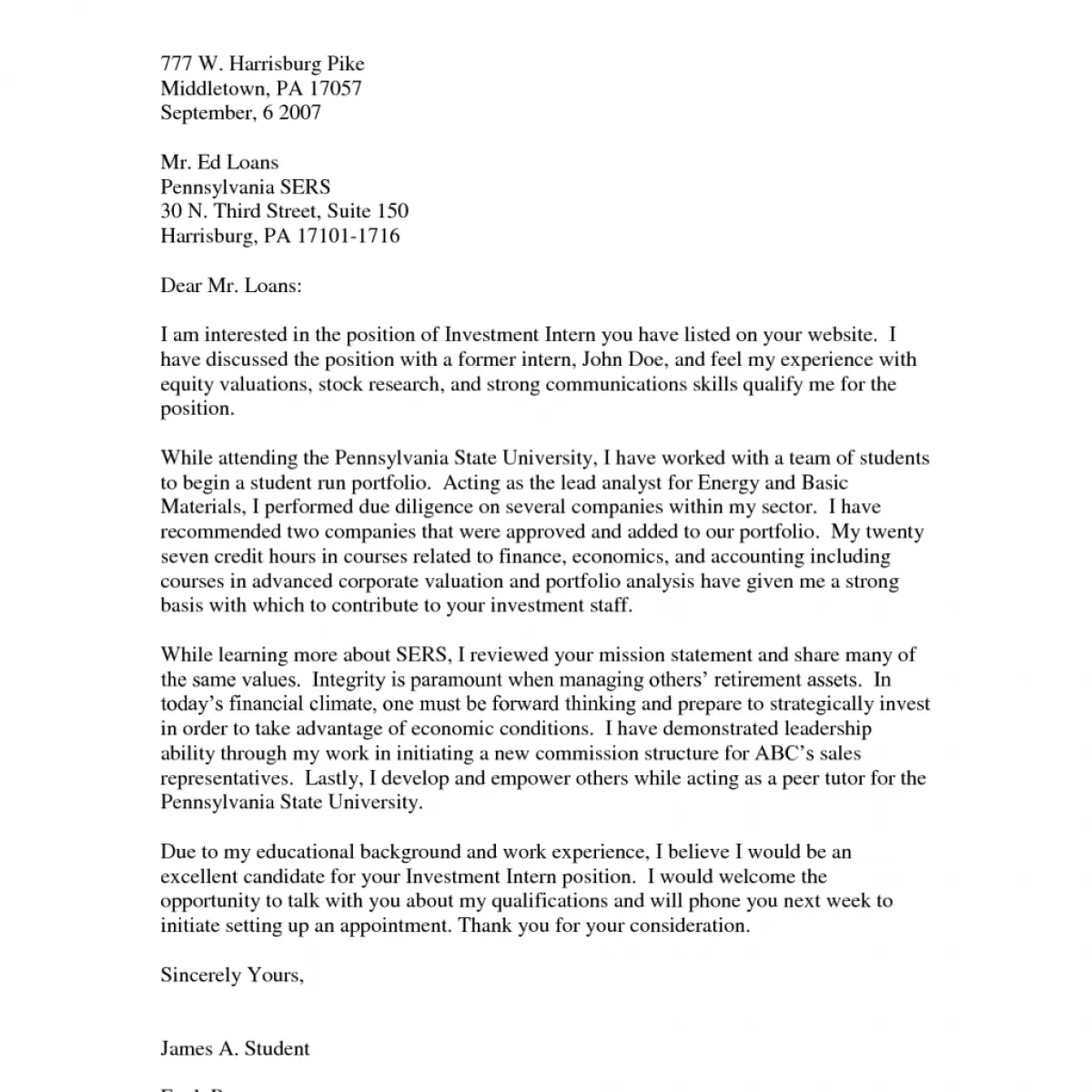
The opening paragraph is your opportunity to immediately capture the reader’s attention and make a positive first impression. Start with a strong hook that is relevant to the position, such as mentioning the job you’re applying for and where you found the listing. Briefly state why you are interested in the internship and the company, and showcase your enthusiasm for the opportunity. If you were referred by someone, mention that in the opening paragraph. Clearly state your goal: to secure an interview for the accounting internship. Keep it concise and focused, and set the tone for the rest of the letter. Remember, you only have a few seconds to grab the reader’s attention, so make your opening paragraph count.
The Body Paragraphs
The body paragraphs should expand on the skills, experience, and qualifications that make you a great fit for the internship. Structure these paragraphs logically, each focusing on a different aspect of your suitability for the role. Provide specific examples to demonstrate your skills and experience, using the STAR method (Situation, Task, Action, Result) to illustrate your accomplishments. Quantify your achievements whenever possible, using numbers and metrics to highlight your contributions. Tie your qualifications to the job requirements and the company’s needs, showing how your skills and experience align with their objectives. Use a professional and confident tone, while maintaining a personable and approachable style. The body paragraphs are an opportunity to showcase your skills and accomplishments, and demonstrate that you are a good fit for the internship.
The Closing Paragraph
The closing paragraph should summarize your interest in the internship and reiterate your enthusiasm. Reiterate your qualifications for the role and express your confidence in your ability to contribute to the team. Include a call to action, such as expressing your eagerness to discuss your qualifications further in an interview and provide your contact information. Thank the employer for their time and consideration, and use a professional closing, such as “Sincerely” or “Best regards.” Proofread the entire letter one last time to catch any errors. The closing paragraph allows you to confirm your interest and leave the employer with a positive impression of your potential.
